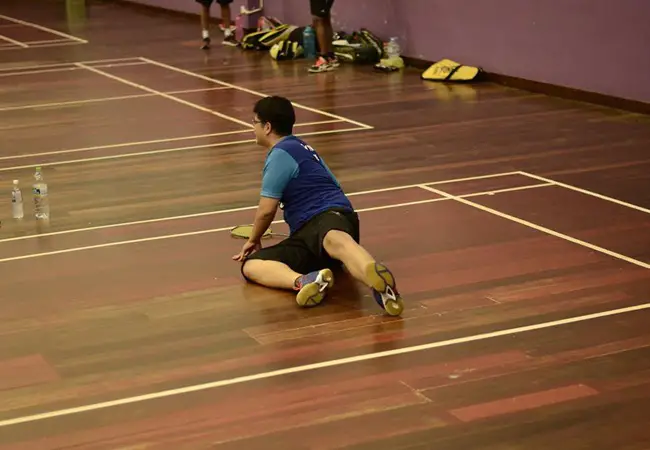The player-coach relationship is an interesting one. In many cases, it’s similar to a parent-child relationship, with many of the same ups and downs. As a player, you want to be loyal to your coach, especially if you have a good relationship with them and produce good results under their guidance.

However, there comes a time where every player needs to decide whether they need to go elsewhere to grow further as a player. This can be a touchy situation, and many coaches can feel slighted when their players move on.
As a junior, I had a few different coaches at my club, but I spent most of my time with Wang Wen. Like many of my peers that played with me during my junior years.
Wang is like a second father to me. We spent a lot of time traveling to tournaments across the country, talking about badminton and life.
It’s fair to say that he was one of the biggest influences in my life. So much of my badminton game has come from his teachings.
When I was 14, he took me from losing first round at the nationals to being a contender for national titles the following year. Many of our club’s players have had similar experiences as countless of our players have won national titles under his guidance.
However, when I was in my last year of juniors, Wang told me that to take my game to the next level, I would need to go elsewhere, that he had taught me all that he could. At that point, I had planned to move to the national training center but was sidelined with a knee injury that ended those plans.
Many of the best players have had similar paths. They reach a point towards the end of their junior careers where they have maxed out what their current coach can offer them. The best coaches recognize this. They leave their own egos out of the equation and allow their players to go out and explore what other coaches have to offer.
Unfortunately, many coaches are more interested in their own results and building their reputation rather than growing their players.
You can probably tell that a player should eventually move on, but there are arguments for both sides. If you stay with the same coach through your career, you know you’re with someone who knows your game well, and perhaps they have a good idea of where they want to bring you for the long term.
They also probably know how to motivate you, what your limits are, and so forth. However, they bring only one perspective to the table. When you bring a new coach into the mix, you get a whole new perspective on your game.
They see things in a different way which is the most valuable thing you can do. This goes hand in hand with sparring with new players, but I’ll get into that in another article sometime later.
An ideal situation is if you are moving from your home club to a place with a high-performance coach of some kind. Someone who deals almost exclusively with high-level players. This ties in with the environment that you’re going to be in as well. A high-performance training environment means that everyone there is serious about being an outstanding player.
However, if that option is not available to you, there is still some advantage of working with a new coach simply because they have knowledge and opinions that your previous coach does not, and that always has value.
What do you think? Should you stay with one coach? Will working with another coach mess up your game? Or is it better to go off and bring your game in a new direction with a new coach?
Not All People Need To Change Coach
Some people think they don’t ever reach a point where a coach cannot take them further. For me, I think the problem is more in a player’s head. You can improve the speed you learn by switching to someone with new ideas and a fresh approach. But often, the increase in performance is due to a player’s enthusiasm being re-kindled.
Changing coaches is necessary to keep you fresh, and Wang Wen is to be commended for suggesting that I move on, but I also lose something of that ‘special relationship’ when a player and coach both know it is a short-term thing.
Maybe the perfect solution is to have both a ‘Performance Coach’ and a ‘Life Coach/Manager’ (for want of a better term!). The Performance Coach is the one who deals with technique and match play, whilst the Life Coach is the one who stays with you and helps you reach the long-term goals—the one who is always in your corner.
I have just realized, another name for a ‘Life Coach’ could be….’ Friend’.
World Travel
The analogy I would use is world travel, or more specifically, LIVING in another city. Of course, you can always grow as a person while staying in the same city for the rest of your life, but if you want to make it to the big time, you’re eventually going to have to move unless you live in one of the major centers.
There is a lot to be said for living in other cities. I grew up living in Edmonton, Canada. Then I lived in NYC for a while. Last year I was living in Copenhagen, and recently I have moved to Toronto. Each city has lots of things to teach you. The different cultures, attitudes, and perspectives teach you things you would never have learned if you never left home.
You don’t need to move on to find a new coach, but I can guarantee you that if you want to be a world-class player who is gunning for the top ranks, you will have multiple coaches throughout your career. If you’re happy with being a national or regional level player, you can stay put.
The other issue with badminton is that very few coaches who deal with fundamental level badminton, coaching the real beginners, also work with the high-level players and vice versa. So the chances are that the coach you started with will not have the high-level experience you need to go further. Plus, after you reach this level, the fundamental skills are less relevant, and it’s more about pushing the player to expand their limits.
You need to consider that you need to wonder how much was down to the ‘new’ coach being able to take you further and how much was down to the individual player responding to the new stimulus and rising to the challenge of the new coaches.
Either way, the result is the same: changing your coach can instantly impact your game.
Although there is no ‘one-size-fits-all’ – everyone is different. Several world champions in the sport have risen to the top but kept the same coach throughout their careers.
It is down to the individual’s makeup: some athletes are very self-driven, while others work better with lots of external stimuli. It is the same with training; some people seem to revel in practicing one-shot repeatedly, whilst others quickly become bored and need the change of routine.
On balance, I would think that far more world-class athletes have changed coaches than those who have stayed with the same coach. The real trick is in the player and coach realizing WHEN it is time to move on.
I definitely agree that the onus for improvement has to fall on the player’s shoulders and that your junior coach can likely always provide value to you. In the end, I think it boils down to having a broader array of experiences.
Response to Stimuli
As players, we respond to stimuli. How often have we been stuck in a rut, changed our practice routine, and re-kindled our desire for the game?
Changing your coach freshens things up and exposes you to new ideas. Look at the change in the Japanese squad since the arrival of Park Joo Bong!
It’s the same as playing in tournaments: if you stick to playing in your own backyard, you can become king of the hill, but it’s only by putting yourself up against better players than you really improve – sink or swim!
The benefits from changing to a new coach USUALLY far outweigh the disadvantages – but it can be hard to make the break on both parts.
Like my friend, he has a similar problem. It’s been 2 years that he has been practicing basics moves, footwork to improve his game with the same coach.
One day, he met a private coach from China in Montreal (an ancient provincial champion who retired from a back injury), and he showed my friend another way of hitting the shuttle with a more accurate form.
When my friend told him his old coach what this man of China told me, the old coach disagreed and showed him his style of hitting the birdie.
Then, when my friend came back to consult the private coach from China, he said he was afraid that my friend’s old coach would not accept his teachings.
Starting from that point on, my friend learned things by himself by playing at different places because he knew that both coaches had good technique and experience to share with him.
However, they are not the only ones. When he looks at the other’s provincials badminton players, he sees many different play styles, and he decides to put some of them in his own game, whether it’s about to drive, drop, clear, smash, fakes, footwork, strategy, etc.
But I agree that a player has to move on to another coach once he finds out his game isn’t changing.
One thing worth mention is that the chemistry between the player and the coach is also very important. If one does not believe in care about the other. It will be tough for the player to improve.
I know my limit and totally agree that a player should seek others with different experiences or techniques. But it’s funny to see my friend coming back to me and ask me what I think about new shoots or drills.
I agree that sometimes you may need to change when you need to learn new things, but as long as you keep in mind what you learned from your other coach, you should be ok when finding another coach. It would help if you learned, adapted to a new style, incorporated that into your current style, and learned more.
The more you know about badminton from different viewpoints, the more interesting and unique your style will become, and the more you will know about various playing techniques, which will, in turn, make you a good coach if you ever decide to become one.
Read also:

